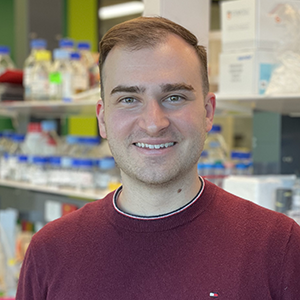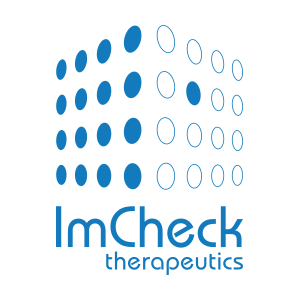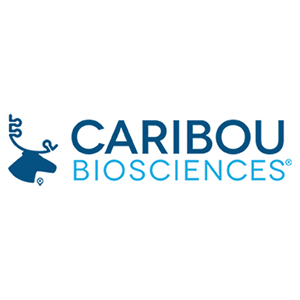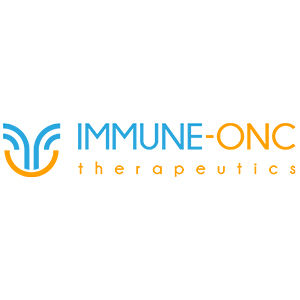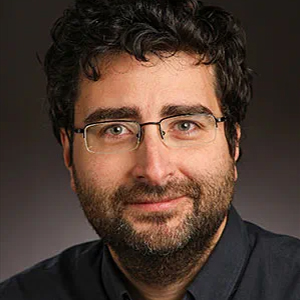Research We Fund
With hundreds of projects currently underway, we fund scientists through our academic grant programs and biotech partners through our strategic venture philanthropy initiative. Use the filters below to find an LLS-funded project.
For a better viewing experience, please use a larger device.
Mechanisms of Inducing differentiation in CBFA2T3-GLIS2 positive AML
AMKL is a rare leukemia that largely affects infants and toddlers. Of the various subtypes of this disease, CBAF2T3-GLIS2 positive AMKL has proven particularly difficult to treat with traditional cytotoxic chemotherapies and bone marrow transplantation with dismal outcomes. The objective of this study is to investigate protein dependencies in CBAFT2T3-GLIS2 fusion positive AMKL to identify new, and desperately needed, drug targets.
Program: Student Mentorship and Research Training (SMART)Project Term: Start Date: July 1, 2024 End Date: June 30, 2025
Understanding Leukemia in Children with Down Syndrome to Develop Better Therapies
This Specialized Center of Research is focused on identifying the contributions of chromosome 21, which is present in three copies in individuals with Down syndrome (DS), to acute leukemia. Children with DS are at a 20-fold increased risk of leukemia compared to the overall pediatric population and frequently have other health issues that complicate leukemia treatment. Although acute myeloid leukemia in children with DS (ML-DS), which frequently evolves from transient abnormal myelopoiesis (TAM), has a better outcome than acute myeloid leukemia (AML) in children without DS, those who relapse following treatment face an extremely poor prognosis. Similarly, children with DS who develop B-ALL have a worse prognosis than those without DS due to excessive treatment-related mortality and increased risk of relapse. Our overarching, united goal is to develop novel therapies to cure DSassociated leukemias and to reduce the side effects of treatment in this vulnerable population. In addition to children with DS, our study has major implications in other cases of pediatric and adult leukemias. For example, chromosome 21 amplification is one of the most significant gains in several classes of malignancies, including certain subtypes of AML, hyperdiploid ALL, and iAMP21. Amplification of chromosome 21 is also a feature of the acute leukemia phase of a disease named myelofibrosis. Therefore, insights we gain from this research will impact a large group of patients with acute leukemia.
Program: Specialized Center of Research ProgramProject Term: Start Date: October 1, 2024 End Date: September 30, 2029
Targeting aberrant epigenetic condensates in myeloid malignancies
Genetic changes of ASXL1 are very frequent in human blood cancers. We found that the altered forms of ASXL1 protein promote blood cancers through forming tiny liquid-like droplets in the cell. In this project, we aim to develop a method to specifically break these droplets to inhibit its activity in driving blood cancers.
Program: DiscoveryProject Term: Start Date: October 1, 2024 End Date: September 30, 2027

Craig Jordan, PhD
University of Colorado Denver, Anschutz Medical Campus
Aurora, ColoradoModeling LSC heterogeneity at unprecedented resolution in AML
Our goal is to perform high-resolution molecular characterization of human leukemia stem cells (LSCs). We have developed an integrated set of single-cell techniques that will assess transcriptional, genomic, and phenotypic features of primary LSC populations obtained from patients undergoing varying forms of treatment. We expect to create a molecular atlas of primary LSCs that will provide the leukemia research community with a powerful resource for the development of improved therapies.
Program: DiscoveryProject Term: Start Date: October 1, 2024 End Date: September 30, 2027
Defining mechanisms of sensitivity and resistance to PI3K gamma inhibition in AML
The goal of our laboratory is to discover, study, and the translate new leukemia therapies to the clinic. In this project, we are studying a signaling pathway, called PI3 kinase gamma, that we believe is important in patients with AML and might lead to new treatments using drugs that target its activity.
Program: DiscoveryProject Term: Start Date: October 1, 2024 End Date: September 30, 2027
Epigenetic Mechanisms and Targeting in Hematological Malignancy
Blood cancers can be caused by aberrant regulation of genes that control cell growth and development. The root cause of this problem may be the presence of mutant regulator proteins in the cell and abnormal switching on or off of target genes. Our SCOR studies the molecular basis of this gene deregulation using cell cultured in the laboratory, in human specimen and animal models.
Melnick will study the complex of proteins evolve in looping DNA segments to put gene regulatory sequences in proximity of genes critical for the development of antibody producing B cells. Abnormalities of this apparatus lead to lymphoma. Roeder will study multi-protein complexes involved in “bookmarking” chromatin (the complex of DNA and histones found in the cell nucleus) by chemical modification. He studies the proteins that initiate transcription of DNA into RNA and that assure the passage of the polymerase that creates messenger RNA across genes. Soto-Feliciano studies TRIM28, a protein essential for growth of acute leukemia will identify its mechanisms and target genes. Licht will study the role of chromatin regulators in the response of the immune system to multiple myeloma and how inhibitors of chromatin regulator inhibitors affect the tumor immune response. Patel will study in explore the three-dimensional structures of these protein complexes critical for gene regulation in blood malignancies to understand their mechanisms and develop new small molecules to modulate their action.
Program: Specialized Center of Research ProgramProject Term: Start Date: October 1, 2024 End Date: September 30, 2029

Daniel Pollyea, MD
University of Colorado Denver, Anschutz Medical Campus
Aurora, ColoradoLower Dose Mitoxantrone for Venetoclax Resistant Acute Myeloid Leukemia
Venetoclax-based regimens are the standard of care for many patients with acute myeloid leukemia (AML) and are highly active therapeutic strategies for this challenging disease. However, some patients do not respond, and most patients who do respond will relapse. We have discovered that resistance to venetoclax may be mediated by the movement patterns of calcium throughout a cell. Furthermore, we have found that mitoxantrone, a conventional chemotherapy agent, can interrupt these calcium fluctuations at very low doses. Therefore we have proposed a clinical trial using lower-dose mitoxantrone for AML patients whose disease has resistance to venetoclax-based regimens.
Program: Academic Clinical Trials Program (ACT)Project Term: Start Date: July 1, 2024 End Date: June 30, 2027
Memory-like NK cells after hematopoietic cell transplant to eradicate measurable residual disease
Relapse in patients with acute myeloid leukemia (AML) after hematopoietic cell transplant (HCT) is associated with extremely poor prognosis and thus remains a major unmet need. Natural killer (NK) cells are attractive for treating relapse in the post-HCT setting as these cells are not associated with causing graft-versus-host-disease. Cytokine-induced memory-like (CIML or memory-like) NK cells described by our group, demonstrate enhanced anti-leukemia activity, and persist for up to several months in an immune compatible post HCT setting (when derived from the stem cell donor). The goal of this trial is to evaluate donor CIML NK cells early after HCT in AML patients with measurable residual disease (MRD) and therefore otherwise with a high risk of relapse.
Program: Academic Clinical Trials Program (ACT)Project Term: Start Date: July 1, 2024 End Date: June 30, 2027
Targeting Myeloid Malignancies through IRAK4 Synthetic Lethality Dependencies
Based on our preliminary data, we hypothesize that IRAK4 inhibition leads to LSPC reprogramming in MDS and AML. Aim 1 will evaluate the mechanism by which IRAK4 inhibition leads to LSPC reprogramming in cell lines, mice, and PDX samples. Aim 2 will concentrate on understanding of how IRAK4 inhibition creates synthetic lethal dependencies with the CELMoD CC-885 and how neosubstrates of CC-885 mediate the synergy upon IRAK4 inhibition in leukemic cells.
Program: Career Development ProgramProject Term: Start Date: July 1, 2024 End Date: June 30, 2027
Harnessing METTL3 inhibition in acute megakaryoblastic leukemia driven by the t(1;22) fusion involving a member of the m6A writer complex
I want to understand how the t(1;22) translocation that involves a member of the m6A writer complex drives acute megakaryoblastic leukemia (AMKL). To identify culprit genes and pathways I will use multi-omics, including RNA, eCLIP, and TimeLapse Seq and proteomics. I will dissect the RBM15-MKL specific effects of a novel METTL3 inhibitor in primary murine and human AMKL in vitro and in vivo. My ultimate goal is to cure this rare infant leukemia by harnessing METTL3 inhibition.
Program: Career Development ProgramProject Term: Start Date: July 1, 2024 End Date: June 30, 2026
Understanding How Hematopoietic Developmental State Determines Oncogenic KMT2A Fusion Formation and Leukemic Potential
My goal is to understand how cancer-associated gene fusions arise and cause disease. Specifically, I am studying how oncogenic fusions involving the gene KMT2A arise in different hematopoietic cell-types and how developmental context drives the development of leukemia. My long-term goals are to leverage an increased fundamental understanding of leukemogenesis provided by this research to improve treatment and lengthen lifespan for patients with KMT2A fusion-driven leukemias.
Program: Career Development ProgramProject Term: Start Date: July 1, 2024 End Date: June 30, 2027

Ana Vujovic, PhD
University of Colorado Denver, Anschutz Medical Campus
Denver, ColoradoInvestigating the dependency for protein synthesis in Venetoclax/Azacitidine-resistant acute myeloid leukemia
Relapsed and/or refractory acute myeloid leukemia (AML) display resistance to Venetoclax and Azacitidine (Ven/Aza) with approximately one third of patients demonstrating upregulated protein synthesis. This proposal will investigate the mechanism(s) underlying the dependence of Ven/Aza-resistant AML on protein synthesis as well as the functional consequences of targeting this pathway. Successful completion of these studies will provide novel insights into Ven/Aza resistance mechanisms.
Program: Career Development ProgramProject Term: Start Date: July 1, 2024 End Date: June 30, 2027
Functionalizing novel PHIP variants in ancestry specific Acute Myeloid Leukemia
AML risk stratification established by previous studies do not reflect survival outcomes observed in Black patients. Exome sequencing of 100 Black AML patients revealed the novel variants previously not affiliated with AML, including PHIP. Using multiomic patient sample captures and GEMMs, we will functionalize variants in PHIP and assess if they drive leukemogenesis and/or therapy resistance. The overall goal of this work is to implement inclusive genetic assessment tools for AML diagnosis.
Program: Career Development ProgramProject Term: Start Date: July 1, 2024 End Date: June 30, 2027
Targeting SF3B1 splicing factor mutant myeloid malignancies through dependency on GPATCH8
Mutations in RNA splicing factors, particularly those involving the core splicing factor SF3B1 are amongst the most common mutations found in myeloid neoplasms. We recently identified a cofactor protein known as GPATCH8 which is required for the aberrant function of mutant SF3B1. We now seek to understand and target the ways in which GPATCH8 and SF3B1 interact. In so doing we hope to develop new treatments for leukemias containing mutant splicing factors.
Program: Career Development ProgramProject Term: Start Date: July 1, 2024 End Date: June 30, 2027
KT1, a novel NK trispecific antibody for the treatment of AML and MDS
New treatments for AML and MDS are urgently needed. We have developed and performed preliminary testing of a novel, patent-protected, trispecific NK cell engager named KT1 which targets AML blasts and leukemia stem cells (LSCs) expressing CD33 and CD123 for elimination by effector cells that express CD16a/b. We plan to test the ability of KT1 to release cytokines and facilitate killing of CD33- and/or CD123-expressing targets by different types of CD16a/b-positive effector cell populations including resting natural killer (NK) cells, cytokine-induced memory-like (ML) NK cells, gamma/delta T cells, and macrophages both in vitro and in leukemic mice. We anticipate that a future treatment of AML and/or MDS with KT1 combined with a donor leukocyte transfer of allogeneic NK, ML NK, or gamma/delta T cells will have excellent therapeutic efficacy and a far better safety profile than many currently studied immunotherapies being tested in patients with AML or MDS.
Program: Translational Research ProgramProject Term: Start Date: July 1, 2024 End Date: June 30, 2027
Targeting TP53-Y220C mutant AML
TP53-Y220C is a recurrent hotspot TP53 mutation observed predominantly in AML and MDS among hematological malignancies. This study aims to investigate the mechanism of action and therapeutic activity of PC14586, a compound designed to bind p53-Y220C protein and stabilize it in the wild-type conformation and to develop mechanism-based combinations that improve its efficacy in TP53-Y220C mutant AML.
Program: Translational Research ProgramProject Term: Start Date: July 1, 2024 End Date: June 30, 2027
Targeting Leukemia Stem Cells with the Novel Antibody Drug Conjugate
To improve the cure rate of patients suffering from acute myeloid leukemia (AML), our study aims to target resistant leukemia stem cells by developing an 'antibody-drug conjugate' (ADC) against CD99, a protein expressed on these cells. Initial tests of two ADC versions have shown promise in combating AML. Our next steps involve refining the anti-CD99 antibody, identifying the optimal drug for conjugation, and testing the ADC on patient-derived leukemia models. Completing these objectives will pave the way for a phase 1 clinical trial, offering a potentially transformative treatment for AML.
Program: Translational Research ProgramProject Term: Start Date: July 1, 2024 End Date: June 30, 2027
Cotargeting oncogenic protein translation and apoptosis in acute myeloid leukemia
The focus of my research is to evaluate the efficacy of and to unravel the molecular mechanisms underpinning a novel drug combination in AML targeting oncogenic protein translation and apoptosis. We will utilize genetic perturbation and other orthogonal approaches, including in vitro and ex vivo assays, and in vivo AML PDX models. The goal of my research is to transform the clinical management of AML patients, particularly for relapsed and difficult-to-treat subgroups.
Program: Career Development ProgramProject Term: Start Date: July 1, 2024 End Date: June 30, 2026
Targeting the cell surface U5 snRNP complex as a novel immunotherapy for AML
A major limitation of immunotherapy approaches for AML has been the lack of known targetable cell surface antigens specific to AML cells. This project characterizes the pathologic and biologic effects of a novel cell surface antigen complex uniquely present on AML cells but not normal hematopoietic precursors, known as the U5 snRNP complex. Furthermore, we will interrogates U5 snRNP complex components as novel AML-associated antigens and CAR T cells targets for AML treatment.
Program: Career Development ProgramProject Term: Start Date: July 1, 2024 End Date: June 30, 2027
Mechanisms of oncogenic transcription in NPM1-mutant myeloid leukemia
NPM1-mutated leukemia is the most common AML in adult and characterized by upregulations of HOXA/B genes and MEIS1. Given the importance of oncogenic transcriptional program, I will determine regulatory molecules that cooperate with mutant NPM1 on chromatin by combining CRISPR/Cas9 screening approach in an innovative model system of endogenous transcription reporters with proteomics approach. This will facilitate identification of novel therapeutic targets specific for NPM1-mutated AML.
Program: Career Development ProgramProject Term: Start Date: July 1, 2024 End Date: June 30, 2026
Glycotyping as a novel approach to study leukemia stem cell heterogeneity and function
Leukemia stem cells (LSCs) are highly heterogeneous populations and key contributors to AML progression. Here, I aim to employ heparan sulfate (HS) glycotyping to resolve LSC heterogeneity. Using complementary genetic and antibody-based approaches, I will delineate the functional roles of HS pathway during AML progression. The newer insights provided by these studies could potentially uncover novel LSC therapies and facilitate diverse training for me to become an independent leukemia researcher.
Program: Career Development ProgramProject Term: Start Date: July 1, 2024 End Date: June 30, 2026
TCR-like CARs targeting GvL mHAgs for the treatment of post-transplant AML relapse
AML recurrence is a devastating event after allo-HCT. I hypothesize that it could be counteracted through targeting of leukemia-restricted mHAgs via TCR-like CARs. I will identify scFVs recognizing mHAg:HLA complexes using a cell-free nanobody screening platform, and test the anti-leukemia activity and safety of CAR-Ts bearing such scFVs in vitro and in vivo. Through this approach, I will build a library of CAR constructs able to provide population-scale coverage for at-risk allo-HCT patients.
Program: Career Development ProgramProject Term: Start Date: July 1, 2024 End Date: June 30, 2026
Epigenetic heterogeneity in age-related clonal hematopoiesis and acute myeloid leukemia
Our focus is to unravel how clonal hematopoiesis (CH) progresses to leukemia. We will investigate how epigenetic heterogeneity affects Tet2-mutant hematopoietic stem cells (HSCs) during aging. We plan to simultaneously trace HSC clonal identity and clonal history by genetic barcode and single-cell multi-omics and determine their epigenetic configurations adaptive in the aged, inflammatory bone marrow. The long-term goal is to create innovative therapeutics to mitigate CH and prolong health span.
Program: Career Development ProgramProject Term: Start Date: July 1, 2024 End Date: June 30, 2029
Novel targeted therapies for acute myeloid leukaemia and multiple myeloma
Outcomes for acute myeloid leukemia (AML) and multiple myeloma (MM) patients remain inadequate and new treatment options to combat resistance against existing agents are urgently needed. My research aims to identify and target selective vulnerabilities of AML and MM cells. I am particularly interested in epigenetic and metabolic pathways that control self-renewal and differentiation of hematopoietic cells and that can be leveraged to modulate cell fate for therapeutic benefit.
Program: Career Development ProgramProject Term: Start Date: July 1, 2024 End Date: June 30, 2029
A phase 2 study of RVU120, a novel CDK8 inhibitor, in combination with venetoclax in patients with AML
In August 2017, LLS TAP partnered with Ryvu Therapeutics (formerly known as Selvita) to support "A Phase 1b Study of SEL120 in Patients With Acute Myeloid Leukemia or High-risk Myelodysplastic Syndrome."
Ryvu Therapeutics is a clinical-stage drug discovery and development company focusing on novel small molecule therapies that address emerging targets in oncology using a proprietary discovery engine platform.
RVU120 (SEL120) is a highly selective first-in-class CDK8/CDK19 small molecule inhibitor. Ryvu is currently enrolling several Phase 2 clinical trials: RVU120 as monotherapy in genetically defined cohorts of patients with relapsed/refractory AML and high-risk myelodysplastic syndromes (RIVER-52, NCT06268574), RVU120 in combination with venetoclax for patients with relapsed/refractory AML (RIVER-81, NCT06191263), RVU120 as monotherapy for patients with low-risk myelodysplastic syndromes (REMARK, NCT06243458) and RVU120 as monotherapy and in combination with ruxolitinib for patients with myelofibrosis (POTAMI-61, NCT06397313).
Program: Therapy Acceleration ProgramProject Term: Start Date: August 7, 2017 End Date: July 14, 2025
Development of a clinical program for myeloid cancer prevention
The majority of myeloid cancers remain incurable. We previously showed that individuals at risk can be identified years in advance, indicating that prevention may be a viable alternative to treatment. Here, we propose a program of work to establish a clinical platform for myeloid cancer prevention. This includes development of a screening strategy, improved understanding of myeloid cancer evolution, identification of treatment targets and establishment of a specialized clinic to deliver therapy.
Program: Specialized Center of Research ProgramProject Term: Start Date: February 1, 2024 End Date: January 31, 2029
Metabolically Optimized, Non-cytotoxic Low Dose Weekly Decitabine/Venetoclax in MDS and AML
Dr. Mendel Goldfinger and collaborators of Einstein have shown in a preliminary trial that weekly low dose decitabine plus one a week venetoclax is highly effective in newly diagnosed patients with MDS or AML. The regimen has reduced toxicity compared to the current dose and schedule of azacitidine plus venetoclax. The proposed new work is attempting to demonstrate in a prospective trial at 3 sites that this data can be replicated and expanded.
Program: Special GrantsProject Term: Start Date: October 1, 2023 End Date: September 30, 2024

Craig Jordan, PhD
University of Colorado Denver, Anschutz Medical Campus
Aurora, ColoradoTherapeutic targeting of AML stem cells 2023
The goal of this SCOR project is to identify and eradicate the root cause of acute myeloid leukemia, the so-called leukemia stem cell (LSC). In the previous cycle of this SCOR grant, we developed two unique strategies, each of which efficiently eradicates LSCs in the laboratory. Going forward, we will expand our scientific efforts to further improve these approaches and also conduct clinical trials to determine whether our approaches to killing LSCs will benefit AML patients.
Program: Specialized Center of Research ProgramProject Term: Start Date: October 1, 2023 End Date: September 30, 2028
Targeting metabolic reprogramming in MDS and AML stem/progenitor cells
Myelodysplastic neoplasms are malignant disorders driven by expansion of diseased hematopoietic stem cells and progression to leukemia. Our investigations have identified the important role of the transporter of amino acid glutamine SLC38A1 in sustaining metabolic demands of rapidly growing malignant stem cells. The goal of this project is to genetically target this transporter to understand its role on tumorigenesis and progression; and to develop SLC38A1 inhibitors as novel therapeutic tools.
Program: DiscoveryProject Term: Start Date: October 1, 2023 End Date: September 30, 2026
New Targeted Therapies for Pediatric Acute Myeloid Leukemia
Our research focuses on the preclinical evaluation of new targeted therapies for high-risk subtypes of childhood AML. We are deploying screening approaches to delete each gene, one-by-one, to identify genes whose deletion leads to death of the leukemia cells. We will evaluate drugs developed against these targets in state-of-the-art models of pediatric AML. Our goal is to translate the most promising findings to clinical trials for children with these very poor outcome subsets of AML.
Program: Dare to DreamProject Term: Start Date: July 1, 2023 End Date: June 30, 2025
211Astatine-CD123 Radioimmunotherapy for Cancer (Stem) Cell-Directed Treatment of Acute Leukemia
Because acute leukemias are very sensitive to radiation, radioisotopes are ideal payloads to arm antibodies against these difficult-to-cure, aggressive blood cancers. Here, we will develop fully human anti-CD123 antibodies carrying the highly potent alpha-emitter astatine-211 (211At) as a new therapy for acute leukemia. CD123 is broadly displayed on acute leukemia cells in most patients and overexpressed on leukemic stem cells but is only found on a small subset of normal blood cells, enabling the use of 211At-CD123 radioimmunotherapy in the transplant and non-transplant setting with limited toxicities to normal tissues.
Program: Translational Research ProgramProject Term: Start Date: July 1, 2023 End Date: June 30, 2026
NK cell immunotherapy to reduce relapse after haploidentical transplant for high-risk pediatric AML
Leukemia recurrence remains the most common type of treatment failure after allogeneic hematopoietic cell transplant for children and young adults with high-risk acute myelogenous leukemia (AML), occurring in 40-50% of patients. Novel treatment strategies are needed to attain durable remissions and provide long-term cure. We have developed a novel memory-like (ML) NK cell immunotherapy that has demonstrated potent activity against AML in preclinical and early clinical studies. We propose a new clinical trial combining donor-derived ML NK cells adoptive cellular therapy with modified αβT cell-depleted haploidentical HCT to enhance graft-versus-leukemia and reduce relapse in pediatric and young adult patients with high-risk AML.
Program: Academic Clinical Trials Program (ACT)Project Term: Start Date: July 1, 2023 End Date: June 30, 2026

Venkata Lokesh Battula, PhD
The University of Texas MD Anderson Cancer Center
Houston, TexasArming NK Cells to Target B7-H3+ AML Cells
In order to develop a novel immunotherapy approach to treating AML, we propose targeting B7-H3 (CD276), a promising immune checkpoint that has been reported to inhibit NK cell activation. We have generated a novel anti–B7-H3 monoclonal antibody (T-1A5) to block B7-H3 function, showing the best in vitro and in vivo activity against AML cells. We will test the hypothesis that combination strategies such as targeting B7-H3 along with BCL2 inhibition (venetoclax) or IL-15r agonist (NKTR-255) result in synergistic inhibition of AML growth.
Program: Translational Research ProgramProject Term: Start Date: July 1, 2023 End Date: June 1, 2026
Strategic combinations to overcome therapeutic resistance and relapse in acute myeloid leukemia
Acute myeloid leukemia (AML) is the most fatal type of leukemia and has a high rate of relapse following current therapies. We have recently uncovered that RSPO3-LGR4 pathway is a key regulator of leukemia-initiating cell activity and is exclusively activated in relapsed and refractory AML. Our project aims to investigate the mechanistic link between the pathway activation and therapy resistance, and design combination therapies that would overcome resistance and improve the treatment of relapsed leukemia.
Program: Translational Research ProgramProject Term: Start Date: July 1, 2023 End Date: June 30, 2026
CD70-directed CAR T-cell therapy for the treatment of relapsed/refractory pediatric AML
In this project, we will test an innovative therapy called CAR T-cell therapy for children with a type of cancer called AML. In the laboratory, we have identified and developed a powerful CAR T-cell therapy that targets a protein called CD70 on AML cells. We propose to now develop a clinical trial in which we will study the effects of this CD70.CAR T-cell therapy in children with AML.
Program: Translational Research ProgramProject Term: Start Date: July 1, 2023 End Date: June 30, 2026
Memory-like natural killer cells and venetoclax to eradicate measurable residual disease in AML
This proposal is to conduct a phase I (early phase) clinical trial to test whether the combination of the approved targeted therapy venetoclax with memory-like Natural Killer (NK) cells is safe and active in patients with acute myeloid leukemia (AML). Based on laboratory research at Dana-Farber Cancer Institute, we believe that the addition of memory-like NK cells obtained from an haploidentical (‘half matched’) donor will be able to eradicate residual leukemia cells left over after prior venetoclax treatment and hence prevent a future relapse of the disease. A total of 10 patients will be treated with two different doses of NK cells and a constant dose of venetoclax. We also plan scientific studies on patient samples to learn more about the function of NK cells when combined with venetoclax, evaluate for clearance of residual leukemia cells with this combination therapy and explore potential resistance mechanisms.
Program: Translational Research ProgramProject Term: Start Date: July 1, 2023 End Date: June 30, 2026
Towards clinical testing of epitope editing to enable novel adoptive immunotherapies
Innovations in gene engineering have made it possible to reprogram immune cells to attack specific targets on cancer cells, allowing the first adoptive cellular immunotherapies, known as CAR T cells, to be approved by the FDA for the treatment B lymphoblastic leukemia. A similar approach is currently under development for AML, but in contrast to B-ALL, there is no leukemia-specific target which would be amenable to targeting by immune cells without incurring severe adverse effects. Here, we aim to modify normal bone marrow stem cells used for allogeneic transplantation to make them resistant to CAR-T cells, thus enabling targeting proteins essential for tumor survival without the risk of severe toxicity on the healthy tissue counterpart.
Program: Translational Research ProgramProject Term: Start Date: July 1, 2023 End Date: June 30, 2026
Uncovering mechanisms of DNMT3A stability in hematologic malignancies
DNMT3A is a critical tumor suppressor in hematologic malignancies; DNMT3A protein levels affect both tumor latency and type. DNMT3A is regulated in part by protein stability, but the mechanisms remain incompletely understood. Here, I will dissect the mechanisms that regulate DNMT3A protein turnover using CRISPR screening and genetically engineered mouse leukemia models. This work will reveal whether its stabilization could contribute to a new therapeutic approach for hematologic malignancies.
Program: Career Development ProgramProject Term: Start Date: July 1, 2023 End Date: June 30, 2026
Mechanisms of Clonal Evolution in the Transformation of MPN to sAML
This research will investigate blood stem cell mutations associated with progression of myeloproliferative neoplasm (MPN) to secondary acute myeloid leukemia (sAML). Our preliminary data suggest that pre-leukemic cells with particular mutations may have a selective advantage in a background of certain MPN subtypes. We will confirm this by utilizing mouse models and both MPN and sAML primary patient samples. Ultimately, we will examine and test inhibition of mechanisms which drive MPN to sAML.
Program: Career Development ProgramProject Term: Start Date: July 1, 2023 End Date: June 30, 2026
Bone Marrow Stromal Cell Senescence Induced by Dnmt3a-Mutant Hematopoiesis Drives Clonal Hematopoiesis and Transformation to Myeloid Malignancy
This project focuses on how age-associated clonal hematopoiesis (CH) alters the bone marrow (BM) microenvironment, and whether this promotes transformation of CH to acute myeloid leukemia (AML). I will utilize single cell RNA-seq data, genetic knockout models, and targeted inhibitors to perturb the non-hematopoietic and hematopoietic compartments of a mouse model of CH. The goal is to determine if manipulation of the BM microenvironment can attenuate CH and prevent AML transformation.
Program: Career Development ProgramProject Term: Start Date: July 1, 2023 End Date: June 30, 2026
Identification and characterization of genetic factors affecting MLL/KMT2A fusion proteins stability in MLL/KMT2A rearranged leukemias
MLL1/KMT2A rearranged leukemias are the most common blood cancer occurring in children characterized by dismal prognosis. Given the importance of fusion proteins in driving the disease, I will determine factors affecting the fusion protein stability through a CRISPR/Cas9 screening approach in an innovative model system where the MLL fusions are endogenously tagged with a fluorescent protein. This will facilitate development of molecular glue degraders specifically targeting the MLL fusions.
Program: Career Development ProgramProject Term: Start Date: July 1, 2023 End Date: June 30, 2026
Molecular basis and new therapeutic strategies in lineage ambiguous leukemia
Lineage-ambiguous leukemias are high-risk blood cancers with unclear biologic basis and suboptimal treatment options. Here, I will identify the cell of origin of lineage ambiguous leukemia and investigate new therapeutic strategies through in vitro and in vivo experimental modeling approaches and preclinical drug studies in patient-derived xenografts. These studies will clarify the cellular and molecular alterations driving lineage ambiguity and advance a new, rational therapeutic approach.
Program: Career Development ProgramProject Term: Start Date: July 1, 2023 End Date: June 30, 2025
Deciphering the role of p53 signaling in NPM1-mutant AML
NPM1c and TP53 mutations are exclusive in acute myeloid leukemia (AML) despite both being commonly present in patients, suggesting a fitness disadvantage for cells with co-occurring mutations. However, the mechanisms underlying this exclusivity have not been explored. This project will utilize novel models to dissect the importance of TP53 signaling in NPM1c+ (pre)-leukemic stem cells. Generated results may highlight therapeutic opportunities for improved risk management of NPM1c+ AML patients.
Program: Career Development ProgramProject Term: Start Date: July 1, 2023 End Date: June 30, 2025

Yiman Liu, PhD
Perelman School of Medicine at the University of Pennsylvania
Philadelphia, PennsylvaniaInvestigating the impact of hotspot mutations in a chromatin reader on leukemogenesis
The goal of this proposal is to investigate the consequence of the chromatin reader eleven-nineteen-leukemia (ENL) gain-of-function mutations in the pathogenesis of leukemia. Our studies leverage the expertise in the molecular and chromatin biology of chromatin reader in leukemia utilizing mouse model, high resolution image, epigenomic and transcriptomic approaches. Our goal is to understand how chromatin reader contributes to cancer development, progression, and therapeutic outcome.
Program: Career Development ProgramProject Term: Start Date: July 1, 2023 End Date: June 30, 2025
Investigating the role of preleukemia duration and clonal burden in progression to AML
The development of acute myeloid leukemia (AML) is preceded by a “preleukemic” phase in which mutated hematopoietic stem cells expand due to a fitness advantage. Our work uses prospective models and analysis of patient samples to study how the duration of preleukemia and how the preleukemic clonal burden affect progression to AML. Results of our studies will shed new light on AML pathogenesis and help guide clinical management of preleukemic conditions such as clonal hematopoiesis.
Program: Career Development ProgramProject Term: Start Date: July 1, 2023 End Date: June 30, 2026

Liling Wan, PhD
Perelman School of Medicine at the University of Pennsylvania
Philadelphia, PennsylvaniaEpigenetic Mechanisms in Acute Myeloid Leukemia
The goal of this project is to investigate the role of the epigenetic regulator Eleven-Nineteen-Leukemia (ENL) and its cancer mutations in acute myeloid leukemia (AML). Our studies leverage the expertise in chromatin biology, functional genomics, and AML modeling, as well as unique chemical compounds and mouse models. Results from this project will provide novel biological insights into our understanding of AML pathogenesis and facilitate the development of novel epigenetic therapies.
Program: Career Development ProgramProject Term: Start Date: July 1, 2023 End Date: June 30, 2028

Eric Pietras, PhD
University of Colorado Denver, Anschutz Medical Campus
Denver, ColoradoTargeting the pathogenic 'fire triangle' of inflammation, metabolism and mutations in myeloid leukemogenesis
My lab is focused on understanding the pathogenic interplay between oncogenic mutations, chronic inflammation and aberrant metabolism as a driver of the evolutionary processes that culminate in lethal myeloid malignancies. We leverage mouse models and human patient samples to establish modalities for targeting this interplay throughout disease pathogenesis. My long-term goal is to improve patient outcomes by establishing therapies that prevent and/or delay evolution to acute leukemia.
Program: Career Development ProgramProject Term: Start Date: July 1, 2023 End Date: June 30, 2028
Metabolic Regulation of Leukemic Cell Fate
Cell-intrinsic metabolic processes are dysregulated in acute myeloid leukemia (AML) and can act to sustain an oncogenic state of differentiation arrest. Using AML cell lines and patient-derived material grown in sophisticated liquid culture medium that mimics human plasma, we will perform metabolically focused in vitro and in vivo CRISPR-Cas9 screens to reveal metabolic regulators of AML cell fate that can be exploited via dietary or pharmacologic intervention as a novel therapeutic strategy.
Program: Career Development ProgramProject Term: Start Date: July 1, 2023 End Date: June 30, 2026
The Immune Niche in the Development of Hematological Malignancies and Implications for Novel Therapy
Our SCOR Program, composed of four complementary Projects supported by three shared Cores, is designed to determine how the immune niche and factors in its composition and regulation affect the initiation and progression of hematopoietic malignancies. Using genetically engineered mouse models, cell cultures and patient samples, the power of multi-omics analyses will be brought to bear to identify common drivers and expose underlying mechanisms. Findings from this work should reveal multiple candidate therapeutic targets whose exploitation may lead to the development of broadly applicable therapeutics for leukemias/lymphomas. Partnerships with pre-clinical and clinical trials experts at our home institutions and beyond will facilitate the translation of our findings to the bedside and potentially provide new hope to patients suffering from these devastating cancers.
Program: Specialized Center of Research ProgramProject Term: Start Date: October 1, 2022 End Date: September 30, 2027
Understanding and Overcoming Mechanisms of Immune Evasion after Allogeneic Transplant
Outcomes for patients with acute myelogenous leukemia who relapse after transplantation are dismal. This SCOR brings together an international group of collaborators with deep expertise in genomics, epigenetics, antigen presentation, and immune-regulation. They will focus on mechanisms of immune evasion by leukemia cells, identifying effective T cell responses to those evasive processes, and providing critical insights into the optimal approaches to model new and promising targets for immunotherapy with a goal of eliminating leukemia recurrence.
Program: Specialized Center of Research Program
Project Term: Start Date: October 1, 2022 End Date: September 30, 2027
CHEK2 as a predisposition gene for clonal hematopoiesis and hematopoietic malignancies
This proposal explores how inherited mutations in the DNA repair gene CHEK2 lead to blood cancers. Our work employs two unique resources: patient-derived cell lines and mice engineered with an inherited Chek2 variant that accurately models how bone marrow stem cells acquire DNA changes over time leading to bone marrow cancers. Our results may lead to new approaches that slow or prevent blood cancers in people with high risk.
Program: DiscoveryProject Term: Start Date: October 1, 2022 End Date: September 30, 2025
Discovering the function and targeting dysregulated nuclear condensates in myeloid leukemia
Although molecular targeted therapy has dramatically changed how we treat cancer, the treatment for acute myeloid leukemia (AML) remains focused on the use of cytotoxic drugs with many patients eventually relapsing with their disease. Our studies have a uncovered a new nuclear structure that is dysregulated in myeloid leukemia. This proposal studies the identity and function of this nuclear body in human AML and strives to identify novel therapeutic strategies and targets in leukemia.
Program: DiscoveryProject Term: Start Date: October 1, 2022 End Date: September 30, 2025
Uncovering the role of TCL1A as a driver of clonal hematopoiesis and hematological malignancies
Mutations in a diverse set of genes can lead to pre-cancerous expansion of blood stem cells, but the factors that mediate the growth of these mutant clones are unknown. We recently discovered that many of these mutations lead to abnormal activation of a gene called TCL1A. Consequently, TCL1A may be an attractive target for treating or preventing blood cancers, but little is known about its function. Here, we will uncover how TCL1A influences the biology of pre-cancerous blood stem cells.
Program: DiscoveryProject Term: Start Date: October 1, 2022 End Date: September 30, 2025

Saar Gill, MD PhD
Perelman School of Medicine at the University of Pennsylvania
Philadelphia, PennsylvaniaRole of the AML "Immunome" in response and failure of chimeric antigen receptor T cell therapy
Most patients with acute myeloid leukemia (AML) are not cured with chemotherapy alone, and most long-term survivors of AML have undergone an allogeneic stem cell transplant (also known as bone marrow transplant). The outlook is quite grim for patients whose AML relapses after transplant. We have developed a new type of treatment for AML called chimeric antigen receptor (CAR) T cells for these patients. The goal of this project is to investigate how to improve CAR T cells for AML.
Program: DiscoveryProject Term: Start Date: October 1, 2022 End Date: September 30, 2025
Interrogation of glutathione biology in relapsed acute myeloid leukemia stem cells
Acute myeloid leukemia (AML) is a devastating blood cancer. Most AML patients will initially respond to standard therapy; however, for many patients the disease recurs resulting in patient death. Consequently, there is an urgent need to develop new therapeutic strategies for relapsed AML patients. The objective of our proposal is to understand and target properties specific to relapsed AML cells with the overall goal of improving relapsed AML patient outcomes.
Program: DiscoveryProject Term: Start Date: October 1, 2022 End Date: September 30, 2025
Niclosamide for the Treatment of Relapsed/Refractory Pediatric Acute Myeloid Leukemia
Niclosamide is an FDA approved anti-parasitic drug that is well tolerated and acts synergistically with chemotherapy to kill AML cells. We will conduct a Phase I clinical trial with niclosamide in combination with cytarabine for children with relapsed/refractory pediatric AML. ShRNA/CRISPR screens demonstrated that Bcl-2 is upregulated in niclosamide resistant cells. We will study the effects of the Bcl-2 inhibitor venetoclax in combination with niclosamide in pediatric AML.
Program: Translational Research ProgramProject Term: Start Date: June 30, 2022 End Date: June 30, 2025
Overcoming RAS-driven Mechanisms of Resistance in Leukemia
The mitogen-activated protein kinase (MAPK) pathway is activated in high-risk leukemia and is a hallmark of resistance to therapies. This project uses patient-derived xenograft models of relapsed pediatric ALL and AML with activated RAS/MAPK to test whether clinically relevant MAPK mutations activate the VAV3/RAC pathway and if pharmacological inhibition of that pathway by a small molecule we developed synergizes with a MAPK-inhibitor to provide a new treatment strategy for RAS-driven leukemia.
Program: Translational Research ProgramProject Term: Start Date: July 1, 2022 End Date: June 30, 2025
Investigating and targeting the histone acetylation reader protein ENL in acute leukemias
Leukemia often results from aberrant gene expression caused by epigenetic alterations. Previously we discovered a novel histone acetylation reader domain in the ENL protein and demonstrated that this domain is essential for the survival of a wide range of acute leukemias, making it an attractive therapeutic target. We will develop specific inhibitors of ENL activity in acute leukemias and will use mouse models to define the role of ENL mutations identified in patients in leukemogenesis.
Program: Career Development ProgramProject Term: Start Date: July 1, 2022 End Date: June 30, 2027
Genomic interrogation of high-risk myeloid neoplasms to identify new therapies
The long-term goal of my research program is to improve the outcomes for patients with high-risk myeloid blood cancers, particularly those with loss of chromosome 7 or CUX1. We are tackling this question using an arsenal of innovative methods and tools, including mouse models, human cells and patient samples, and state-of-the-art technologies to examine the cancer cell genome. Accomplishing this work will reveal new treatments and strategies for preventing blood cancers from arising.
Program: Career Development ProgramProject Term: Start Date: July 1, 2022 End Date: June 30, 2027
Targeting the interplay between signaling and transcriptional dysfunction in myeloid leukemias
Our research program is focused on understanding the intersection between signaling and transcriptional dysfunction in myeloid leukemias. We leverage murine models, cell lines and human samples to uncover how biological context shapes the manifestation of oncogenic programs at the molecular level. Our long-term goal is to harness this knowledge to identify multipronged therapeutic strategies that improve outcomes for patients with myeloid malignancies.
Program: Career Development ProgramProject Term: Start Date: July 1, 2022 End Date: June 30, 2027
Genetic pathways of myeloid transformation and treatment response
Our central goal is to improve clinical outcomes in patients with myeloid malignancies through developing an enhanced mechanistic understanding of disease. We use multiomic analyses of primary patient samples combined with complementary laboratory models using mice and cell lines to generate and test our hypotheses. The results of our studies will help improve patient outcomes by identifying strategies to mitigate risk of disease progression/relapse and treatment toxicity.
Program: Career Development ProgramProject Term: Start Date: July 1, 2022 End Date: June 30, 2027
Understanding the clonal origin, evolution, and progression of myeloid malignancies
The overarching focus of my research is to understand the clonal origin, evolution, and progression of myeloid malignancies and biological and clinical factors that influence the process. We tackle this question by analyzing patient samples with integrated approach combining single-cell omics, evolutionary genetics, and computational analytics. The ultimate goal of our research is to develop clinical strategies for early detection, prevention, and treatments of myeloid malignancies.
Program: Career Development ProgramProject Term: Start Date: July 1, 2022 End Date: June 30, 2027
Combined targeting of ATR and replicative stress in TP53-mutated AML
This research will test a promising new drug combination in acute myeloid leukemia (AML) carrying TP53 gene mutations, which is resistant to chemotherapy and has a median survival of less than 5 months. Our preliminary data show that TP53-mutated AML is selectively sensitive to the combination of an ATR inhibitor and decitabine. We will confirm activity of this novel drug combination using mouse models of leukemia and human AML samples and explore mechanisms of responsiveness.
Program: Career Development ProgramProject Term: Start Date: July 1, 2022 End Date: June 30, 2024
Mechanisms of Pathogenesis by MYB Fusions in Blastic Plasmacytoid Dendritic Cell Neoplasm
The transcription factor MYB has long been associated with leukemia, but how it contributes to disease is poorly understood. Fusions of MYB to other proteins, causing MYB activation, are found in patients with Blastic Plasmacytoid Dendritic Cell Neoplasm (BPDCN), but rare in other leukemias. I am using recently developed techniques to gain insight into how MYB fusions cause BPDCN. This will enable both new treatments for BPDCN and better understanding of the role of MYB in other leukemias.
Program: Career Development ProgramProject Term: Start Date: July 1, 2022 End Date: June 30, 2024
Defining PIK3R5-related PI3K gamma dependency as a novel therapeutic target in blood cancers including BPDCN
Blastic plasmacytoid dendritic cell neoplasm (BPDCN) is an aggressive blood cancer without adequate treatment. In a genome-wide CRISPR interference screen, BPDCN was highly dependent on the PI3Kγ pathway and specifically the PIK3R5 adaptor subunit. A subset of leukemias may share this vulnerability. We will interrogate the mechanism of this unique dependency and integrate PIK3R5/PI3Kγ targeting with leukemia therapy. Our goal is to provide novel treatments for PIK3R5-dependent malignancies.
Program: Career Development ProgramProject Term: Start Date: July 1, 2022 End Date: June 30, 2025

Lucas Ferrari De Andrade, PhD
Icahn School of Medicine at Mount Sinai
New York, New YorkOptimizing MICA/B antibody for AML by selective binding to Fc activating receptors
Acute myeloid leukemia (AML) is a blood cancer characterized by poor clinical outcomes. We developed an antibody that inhibits AML in models by triggering anti-leukemia immunity. Now we developed a new version of this antibody with higher affinity to the leukocyte receptors that mediate anti-leukemia immunity. We will establish the ability of this optimized antibody to elicit greater inhibition of AML. The studies will generate important information about how to induce anti-leukemia immunity.
Program: Translational Research ProgramProject Term: Start Date: July 1, 2022 End Date: June 30, 2025
Targeted combination therapies for leukemia with NUP98 translocations
Leukemia patients with chromosomal translocations of the Nucleoporin (NUP98) gene suffer from very poor prognosis. In this project we will identify new treatment for these patients by combining menin inhibitor with FDA approved drugs. We will evaluate effectiveness, mechanism of action and biomarkers of treatment response to these combinations in advanced pre-clinical models of NUP98 leukemia. We expect these studies will lead to future clinical trials in AML patients with NUP98 translocations.
Program: Translational Research ProgramProject Term: Start Date: July 1, 2022 End Date: June 30, 2025
Studies on clonal hematopoiesis in the 911 WTC first responders
The terrorist attacks on the World Trade Center (WTC) created an unprecedented environmental exposure to WTC aerosolized dust and gases that contained known and suspected carcinogens including polycyclic aromatic hydrocarbons, polychlorinated biphenyls, polychlorinated furans, dioxins and asbestos. Studies from Dr. Verma's group and others have reported an excess of cancer cases in the WTC-exposed Fire Department of the City of New York (FDNY) firefighters, including a trend towards higher incidence of multiple myeloma and leukemias. He now will be deep sequencing a large group of WTC-exposed firefighters to look for clonal hematopoiesis (CH) which is an acquisition of leukemia associated mutations associated with increases in the risk of hematologic cancer.
Program: Special GrantsProject Term: Start Date: June 1, 2022 End Date: July 14, 2025
A phase 2 expansion study of ICT01, an anti-BTN3A monoclonal antibody, in combination with azacitidine and venetoclax in patients with AML
In June 2022, LLS made an equity investment in ImCheck Therapeutics to "Support Clinical Development of the ICT01 Program for Blood Cancer Indications."
ImCheck Therapeutics is designing and developing a new generation of immunotherapeutic antibodies targeting butyrophilins, a novel super-family of immunomodulators.
ICT01 is a humanized, anti-BTN3A (also known as CD277) monoclonal antibody that selectively activates γ9δ2 T cells, which are part of the innate immune system that is responsible for immunosurveillance of malignancy and infections. The EVICTION study is currently enrolling a Phase 2 cohort expansion of ICT01 in combination with azacitidine and venetoclax in patients with newly diagnosed acute myeloid leukemia (NCT04243499).
Program: Therapy Acceleration ProgramProject Term: Start Date: June 13, 2022 End Date: July 14, 2025
SHP2 and BCL2 Inhibition in Acute Myeloid Leukemia
The goal of our work is to use a “bench to bedside and back” approach to develop new treatments for patients with relapsed/refractory AML. Through genetic analysis of patients who relapse or do not respond to standard and investigational treatments, we discover potential resistance mechanisms. In the lab, we test novel drugs and identify new drug targets that may address these resistance mechanisms when used in combination with other therapies. The overall goal of our research program is to improve treatment options and survival of patients with refractory AML.
Program: Career Development ProgramProject Term: Start Date: October 1, 2021 End Date: September 30, 2026
Improving the outcomes of young Black adults diagnosed with acute myeloid leukemia
Young Black patients diagnosed with acute myeloid leukemia (AML) have significantly shorter survival compared to White patients. To comprehensively assess genetic, genomic and biologic contributors to the race-associated survival disparity, we propose a complementary approach that addresses major knowledge gaps in our current understanding of AML biology in Black patients, including the overdue characterization of the Black AML genome and subsequent delineation of biologic response to treatment.
Program: Translational Research ProgramProject Term: Start Date: October 1, 2021 End Date: September 30, 2024
Exploiting Vulnerabilities in RNA Splicing to Treat Hematologic Malignancies
RNA splicing is a central metabolic pathway that is frequently perturbed in hematopoietic malignancies (HMs) that harbor mutations in spliceosome components (most commonly affecting SRSF2, SF3B1, U2AF1, or ZRSR2). These mutations are particularly prevalent in myeloid malignancies (e.g., MDS, MDS/MPN, sAML), but recent pan-cancer studies have implicated aberrant splicing in >30 tumor types. The Project Leaders have probed the molecular consequences of aberrant splicing and identified critical pathways that are amenable to targeted inhibition, including the DNA damage response (Graubert/Walter), the nonsense-mediated RNA decay (NMD) pathway (You/Walter), the spliceosome itself (Abdel-Wahab/Walter/Graubert), and others. To date, effective therapies for HMs have not capitalized on these unique vulnerabilities. The goal of this SCOR is to generate testable clinical hypotheses based on careful mechanistic studies in pre-clinical models and to rapidly move these ideas into the clinic in the near term.
Program: Specialized Center of Research ProgramProject Term: Start Date: October 1, 2021 End Date: September 30, 2026
A phase 1 study of CB-012, a CRISPR-edited allogeneic CAR-T targeting CLL1, in patients with acute myeloid leukemia
In February 2021, LLS made an equity investment in Caribou Biosciences to "Support allogeneic CD371 (CLL-1) CAR development for acute myeloid leukemia."
Caribou is a clinical-stage biotechnology company, co-founded by CRISPR pioneer and Nobel Prize winner Jennifer Doudna, Ph.D., using next-generation CRISPR genome-editing technology to develop “off-the-shelf” (allogeneic) CAR therapies for hard-to-treat blood cancers.
CB-012, an allogeneic CLL1 CAR-T cell therapy engineered with five genome edits, is the first allogeneic CAR-T cell therapy with both checkpoint disruption through a PD-1 knockout, and immune cloaking. The AMpLify Phase 1 clinical trial, which is evaluating CB-012 in patients with relapsed or refractory acute myeloid leukemia (r/r AML), is currently enrolling (NCT06128044).
Program: Therapy Acceleration ProgramProject Term: Start Date: February 28, 2021 End Date: July 14, 2025
A phase 2 registration-directed clinical study of ziftomenib (KO-539), a menin inhibitor, in patients with NPM1-mutant relapsed or refractory AML
Starting in July 2010, LLS TAP supported a promising University of Michigan research project led by Jolanta Grembecka, PhD, to develop new treatments for patients with a rare and lethal subtype of leukemia. Through TAP, LLS engaged chemists to improve the properties that produced lead compounds that exhibited potent anti-leukemic activity. In 2014, LLS introduced Kura Oncology to the project that ultimately led to Kura Oncology completing a licensing agreement with the University of Michigan to continue to develop these molecules.
Kura Oncology is a clinical-stage biopharmaceutical company committed to realizing the promise of precision medicines for the treatment of cancer with a pipeline that consists of small molecule drug candidates that target cancer signaling pathways.
Ziftomenib (KO-539) is selective small molecule inhibitor of menin. Ziftomenib is currently in a Phase 2 registration-directed clinical trial in patients with NPM1-mutant relapsed or refractory AML (NCT04067336).
Program: Therapy Acceleration ProgramProject Term: Start Date: December 22, 2014 End Date: July 14, 2025
A phase 1 expansion study of IO-202, an antibody targeting LILRB4, in combination with azacitidine in patients with monocytic differentiation AML and CMML
In March 2021, LLS made an equity investment in Immune-Onc Therapeutics to support the "Phase 1 Clinical Development of IO-202, An Antibody Targeting LILRB4, for the Treatment of AML with Monocytic Differentiation and CMML."
Immune-Onc is a private, clinical-stage cancer immunotherapy company dedicated to the discovery and development of novel myeloid checkpoint inhibitors for cancer patients. The company aims to translate unique scientific insights in myeloid cell biology and immune inhibitory receptors to discover and develop first-in-class biotherapeutics that reverse immune suppression in the tumor microenvironment. Immune-Onc has a differentiated pipeline with a current focus on targeting the Leukocyte Immunoglobulin-Like Receptor subfamily B (LILRB) of myeloid checkpoints. The company’s work builds on early research by Chengcheng (Alec) Zhang, Ph.D. at the University of Texas Southwestern Medical Center that was also funded by LLS grants.
IO-202 is a first-in-class antibody targeting the LILRB4 and has entered a phase 1 cohort expansion clinical trial (NCT0437243) for the treatment of AML (IO-202 in combination with azacitidine) and CMML (IO-202 in combination with azacitidine).
Program: Therapy Acceleration ProgramProject Term: Start Date: March 5, 2021 End Date: July 14, 2025
A phase 2 study of RVU120, a novel CDK8 inhibitor, in genetically defined cohorts of patients with AML and high-risk MDS
In August 2017, LLS TAP partnered with Ryvu Therapeutics (formerly known as Selvita) to support "A Phase 1b Study of SEL120 in Patients With Acute Myeloid Leukemia or High-risk Myelodysplastic Syndrome."
Ryvu Therapeutics is a clinical-stage drug discovery and development company focusing on novel small molecule therapies that address emerging targets in oncology using a proprietary discovery engine platform.
RVU120 (SEL120) is a highly selective first-in-class CDK8/CDK19 small molecule inhibitor. Ryvu is currently enrolling several Phase 2 clinical trials: RVU120 as monotherapy in genetically defined cohorts of patients with relapsed/refractory AML and high-risk myelodysplastic syndromes (RIVER-52, NCT06268574), RVU120 in combination with venetoclax for patients with relapsed/refractory AML (RIVER-81, NCT06191263), RVU120 as monotherapy for patients with low-risk myelodysplastic syndromes (REMARK, NCT06243458) and RVU120 as monotherapy and in combination with ruxolitinib for patients with myelofibrosis (POTAMI-61, NCT06397313).
Program: Therapy Acceleration ProgramProject Term: Start Date: August 7, 2017 End Date: July 14, 2025
Cellular Crosstalk In The Normal And Malignant Bone Marrow
We want to understand how leukemia inhibits blood production as this is one of the main causes of death in leukemia patients. We use new microscopy techniques developed by our group to image—for the first time—all types of blood cells and how they are eradicated by leukemia cells. Identification of the mechanisms through which leukemia inhibits blood production will be the foundation for new studies to develop drugs to maintain normal blood levels and prevent death in leukemia patients.
Program: Career Development ProgramProject Term: Start Date: October 1, 2021 End Date: September 30, 2026

Jeffrey Magee, PhD, MD
Washington University School of Medicine in St. Louis
St. Louis, MissouriNeonatal origins of pediatric AML
Coming soon.
Program: Career Development ProgramProject Term: Start Date: July 1, 2021 End Date: June 30, 2026
Cardioprotective Strategies and Cardiotoxicity Prediction in Children with Acute Myeloid Leukemia
We seek to reduce the adverse cardiac effects of chemotherapy in pediatric AML patients. We are assessing markers of heart function and injury to compare two clinical strategies for prevention of chemotherapy-induced heart injury. We are also developing a tool using these markers of heart function to characterize a child’s risk for cardiac dysfunction, which is critical to guiding safe chemotherapy delivery. By reducing the toxicity of therapy on the heart we hope to optimize delivery of effective chemotherapy and contribute to long-term leukemia cure without the burden of life-threatening heart disease during survivorship.
Program: Career Development ProgramProject Term: Start Date: July 1, 2019 End Date: June 30, 2024
Multi-modal Immunotherapeutic Targeting of AML-restricted Targets in Infants and Children
Advances in understanding and management of AML in children has been stagnant for decades. Observed improvements in survival are more directly linked to improvements in supportive care or risk identification rather than advances in therapeutics. Excitement around FDA approval of two new IDH1/2 inhibitors did not reach the pediatric oncology community given paucity or absence of such mutations in children. This also highlights the stark differences between AML in older adults and that in younger patients. Thus, “trickle down therapeutics” where therapies that are developed in older adults are used effectively in children is a flawed concept. Discoveries and therapeutic development in younger patients must be prioritized if meaningful advances are to be made in curing AML in younger patients. Given that AML in children is not a priority for the pharmaceutical companies, alternate mechanisms for advancing therapeutics in children and young adults should be implemented.
Program: Specialized Center of Research ProgramProject Term: Start Date: October 1, 2021 End Date: September 30, 2026
Novel immunotherapeutic strategies in infants with high risk AML
Treatment of AML in infants is especially challenging given unique genetic make-up of the disease as well as specific susceptibilities of the host. We will leverage the RNA Seq data from over 2000 patients to discover and validate novel targets (cell surface proteins), and in collaboration with Dr. Correnti (Protein Scientist) and Dr. Fry (CART development expert) generate and test novel antibodies, ADCs, BiTEs and CARTs directed against leukemia-specific targets in infants.
Program: Translational Research ProgramProject Term: Start Date: July 1, 2019 End Date: December 31, 2022
Role of HLX in leukemia induction and maintenance
We and others have shown how HLX overexpression keeps blood cells more immature by blocking their differentiation and promoting their proliferation, a characteristic which is inherent to AML. However, whether there is a causative role of HLX in the induction of AML is still unclear. Hence, the aim of my study is to better understand, using genetically engineered mice models, retroviral models, and human AML patient samples, how HLX drives AML at molecular level. This study will uncover potential therapeutic strategies for AML treatment in future.
Program: Career Development ProgramProject Term: Start Date: April 1, 2021 End Date: March 31, 2024
Synergistic targeting of metabolic and epigenetic vulnerabilities in leukemia stem cells
Our lab is focused on identifying unique features that distinguishes acute myeloid leukemia (AML) stem cells from normal blood-forming stem cells. The cells that make more AML cells than others are called AML stem cells, and these cells need to be eradicated to achieve deep therapeutic responses. We believe targeting metabolism may achieve this goal and found strategies to target AML stem cell metabolism without harming normal stem cells. We hope that our study will lead to improved therapies against AML targeting metabolism to achieve deep remission with little toxicity.
Program: Career Development ProgramProject Term: Start Date: July 1, 2019 End Date: June 30, 2024
Targeting Epigenetics in Myeloid Malignancies
We have a highly collaborative team of investigators, whose goal is to develop novel therapeutic approaches to MDS and AML as well as to improve current therapies for these diseases based on a detailed understanding of how epigenetic dysregulation contributes to myeloid neoplasia. We are focusing on the clonal MDS or AML cell and on the bone marrow microenvironment (BMME), including immune cells that could contribute to or limit the progression of these disorders. Our Center brings together chemists, biochemists, cellular biologists and molecular biologists, who are supported by three core facilities, including an Administrative core, an Epigenomics core and a Bioinformatics and Big data sharing core. To advance our Center’s ability to implement personalized therapies for patients with myeloid malignancies, we have generated and will generate novel reagents, and utilize state-of-the-art in vitro and in vivo assays to identify key modulators of drug sensitivity or resistance. We will focus on so-called “epigenetic-focused” therapy, realizing that many of the enzymes that regulate epigenetic control of cell fate, influence signal transduction pathways, RNA splicing events, and the activity of key cellular proteins, such as BCL2 family members and p53.The genetic mutations that underlie myeloid malignancies have been identified, and we and others have generated mouse models that have pinpointed the role that these genes and their mutations play in normal and malignant hematopoiesis. Our institutions have biospecimen banks with large numbers of MDS and AML samples, and active clinical trial portfolios, that have led to FDA approval of a variety of novel agents, including IDH1/2 inhibitors. The next step in delineating the pathogenesis and Achilles’ heel of these disorders is to better define the role of epigenetic abnormalities play in disease initiation and progression, and to define how targeting LSD1, the CoREST complex, PRMT5 and inflammation signals may advance current treatment strategies (e.g. VEN/AZA), and to enhance the activity of promising agents currently under investigation (menin inhibitors, etc.). Identifying the dependencies and vulnerabilities created by genetic or epigenetic abnormalities will allow us to more rationally advance the treatment of myeloid malignancies, a disease focus where headway is beginning to be made.
Defining the crosstalk between different epigenetic regulators, and how they affect cellular and extracellular processes other than histone proteins, may identify unique sensitivities that can increase the therapeutic index for novel, epigenetic-focused treatments, and identify potentially synthetic-lethal combination therapies. The individual projects in our Center, cover three key aspects of gene regulation and chromatin structure. Project 1 is focused on the LSD1 demethylase, which plays a role in myeloid differentiation, Project 2 is focused on the role of PRMT5 in regulating LSC self-renewal, proliferation and survival, and the expression of potential immunogens, and Project 3 is focused on the interaction between the BMME and the epigenome in mediating sensitivity to epigenetic agents in CMML and MDS. Thus, our center will span the continuum from basic mechanisms of disease initiation and progression, to clinical issues related to therapeutic sensitivity vs. resistance.
Ramin Shiekhattar first discovered that MAO inhibitor antidepressants such as tranylcypromine (TCP), can inhibit the LSD1 demethylase. This finding led to a recently published clinical trial of AZA + TCP in MDS and AML patients led by Justin Watts, and to a new clinical program, that will be continued at Sylvester and MSKCC. They will work with Phil Cole, who founded a biotech company in 2011 that is synthesizing novel epigenetic-focused therapies, to examine how targeting the CoREST complex can synergize with clinically available MDS/ AML cells differentiation- or apoptosis-inducing agents. Several lead compounds are now being tested in the Shiekhattar and Nimer labs.
Omar Abdel-Wahab and Stephen Nimer have discovered several oncogenic functions of PRMT5, an arginine methyltransferase targeted by several small molecule inhibitors that are now in clinical trials for MDS or AML patients at Sylvester and MSKCC. They will work with Luisa Cimmino to exploit their work implicating PRMT5 in regulating homologous recombination, RNA splicing and p53 function. Maria Figueroa has extensively studied predictors of the clinical response to DNA hypomethylating agents (HMA) and has identified critical mediators of HMA resistance originating in the BMME. She will work with Ross Levine, a leader in delineating the molecular pathogenesis of hematologic malignancies, to evaluate how signals from the BMME impact the responsiveness of MDS and CMML cells to HMA combinations as well as how to overcome primary resistance to HMA by targeting key signals in the niche.
Three Cores will enable the efficient completion of our collaborative studies. Core A, the Administrative Core, will be housed at UM; it will provide infrastructure support, to optimize interactions between the various labs represented here, handle all financial and reporting aspects of the grant, assist with the SCOR site visit and the annual meeting of the Center, and maintain regulatory compliance for the Center (e.g. assuring access to bio-specimens, handling IRB and IACUC approvals, etc.). Both UM and MSKCC continue to collect MDS/AML/MPN bio-specimens. Core B, the Epigenomics Core, led by Sion Williams and Lluis Morey, will perform various NGS-based assays to assess genome-wide changes in gene expression, DNA methylation, and histone post-translational modifications. Core C, the Bioinformatics and Big Data Core, led by Stephan Schürer, will provide bioinformatics support and ensure complete and efficient sharing of data for all three projects in the SCOR.
Program: Specialized Center of Research ProgramProject Term: Start Date: October 1, 2022 End Date: September 30, 2027

Thomas Koehnke, MD
Board of Trustees of the Leland Stanford Junior University
Palo Alto, CaliforniaThe role of truncating ASXL1 mutations in disease initiation and progression of human myeloid malignancies
N/A
Program: Career Development ProgramProject Term: Start Date: July 1, 2021 End Date: June 30, 2024
Targeting kinase-dependent dysregulation of transcription factor control in acute myeloid leukemia
Defining mechanisms of dysregulated gene control are central to understanding cancer and the development of effective therapies. Our research is focused on the mechanisms of gene control dysregulation in acute myeloid leukemia (AML), a refractory form of blood cancer that affects both children and adults. Using new methods for manipulating proteins, we are defining essential mechanisms by which AML cells enable cancer-causing gene expression. This work also allowed us to develop new drugs to specifically block this in cancer, but not healthy cells. Ongoing work aims to define precise mechanisms of cancerous gene control and develop definitive treatments for its control.
Program: Career Development ProgramProject Term: Start Date: July 1, 2019 End Date: June 30, 2024

Carl June, MD
The Trustees of the University of Pennsylvania, Medical Center
Philadelphia, PennsylvaniaPan-heme CAR: Anti-CD38 CAR T cells for myeloid, lymphoid and plasma cell malignancies
Our SCOR team has a razor-sharp focus on an exciting new treatment modality for blood cancers: chimeric antigen receptor (CAR) T cells. T cells can be trained to target cancer cells by genetic modification. In fact, previous support from the Leukemia & Lymphoma Society allowed us to successfully develop CAR T cells targeted to CD19, a pan-B cell marker. This treatment, generically called CART-19, was approved by the FDA in 2017 for the treatment of B-cell acute lymphoid leukemia (B-ALL) and in 2018 for some non-Hodgkin lymphoma (NHL), with promising results in other B cell malignancies such as chronic lymphocytic leukemia (CLL). Thus, the development of a single therapy for a single disease (initially, CLL) paid handsome dividends when translated to a broader range of CD19-expressing malignancies (ALL, NHL).
Program: Specialized Center of Research ProgramProject Term: Start Date: October 1, 2019 End Date: May 31, 2025

Craig Jordan, PhD
University of Colorado Denver, Anschutz Medical Campus
Aurora, ColoradoTherapeutic targeting of AML stem cells 2018
Our SCOR team seeks to fundamentally reinvent the ways in which physicians diagnose and treat acute myeloid leukemia (AML). For over 40 years, AML has been treated with a combination of chemotherapy drugs that have major side effects and usually only provide short-term benefit to patients. Indeed, survival rates for most AML patients are dismal, and quality of life for these patients is poor. Consequently, improved strategies for AML are a huge priority for the field. We believe that the lack of progress against AML is due to a single, fundamental failure of existing therapies: While current therapies attack leukemia cells, they fail to act against the real root of the problem, namely leukemia stem cells. It’s like mowing over weeds in a lawn. If the roots are not removed, the weed (disease) will grow back. And like eradicating the roots of weeds, AML stem cells have proved difficult to treat. This is primarily due to the fact that AML stem cells within a given patient can exist in multiple forms, each of which has a differing response to therapy. In other words, while various drugs can often kill some AML stem cells in a patient, completely eradicating all the AML stem cells can be very difficult.
Program: Specialized Center of Research ProgramProject Term: Start Date: October 1, 2018 End Date: September 30, 2024

Daniel Pollyea, MD
University of Colorado Denver, Anschutz Medical Campus
Aurora, ColoradoTargeting Leukemia Stem Cells in the Clinical Setting: The Development of A Comprehensive Program
My focus is to develop a program in which novel therapies targeting leukemia stem cells (LSCs) are tested in clinical trials. This is achieved via partnership with laboratory-based colleagues who identify vulnerabilities in LSCs. Once recognized, we find or develop drugs to exploit these weaknesses through clinical trials for acute myeloid leukemia patients. The goal is to bring forward new therapies that result in deep and durable responses, which also have the potential to cure this disease.
Program: Career Development ProgramProject Term: Start Date: July 1, 2019 End Date: June 30, 2024
Detection and Targeting of Enzymatic Base Editing Deregulation in Leukemia Stem Cells
Dr. Jamieson is examining the role of two enzymes (APOBEC3 and ADAR1) known to mutate DNA and RNA, and their role in acute myeloid leukemia (AML) and disease relapse, particularly in elderly patients.
Program: DiscoveryProject Term: Start Date: July 1, 2020 End Date: June 30, 2024
Cytokine induced memory-like NK cell immunotherapy to target post transplant relapse
Coming soon.
Program: Career Development ProgramProject Term: Start Date: July 1, 2021 End Date: June 30, 2026
Reaching out to underserved & minority patients with hematological diseases in the southeastern US
Vanderbilt-Ingram Cancer Center (VICC) is the only NCI designated cancer center that serves both adult and pediatric populations in TN, one of the highest cancer-mortality states in the country. In fact, TN rural dwellers encompass about 30-50% of the states’ population, many with lower per-capita income and high school graduation rates. Influencing cancer care by facilitating underserved and minority populations to access therapeutic clinical trials as well as those focused on screening and prevention strategies remains a cornerstone objective. The Vanderbilt Health Affiliated Network (VHAN) serves as the largest provider for an organized network of hospitals, clinics, and health systems across TN. This network encompasses 12 health systems and 61 hospitals. Within VHAN, the VICC has had a formal affiliation with Baptist Memorial Healthcare Corporation (BMHCC) since 2012. BMHCC is affiliated with 22 hospitals and provides care for 8000 new cancer patients (pts) annually covering 111 counties totaling 4.3 million people. This includes 44% of the 252 counties and parishes in the Delta Regional Authority, congressionally acknowledged as the most indigent population in the US. The primary objective of the VICC community center affiliation with BMHCC is to enhance the regional level of cancer care and to advance cancer research efforts. VICC has provided guidance on a regular basis to assist BMHCC in the establishment and implementation of the Minority and Underserved National Cancer Institute Community Oncology Research Program (NCORP) grant as a successful and sustainable program. BMHCC has become amongst the top recruitment sites for NCORP, with steady growth in the proportion of rural pts seen across the health system. VICC continues to be a resource for BMHCC on providing consultations, training, and best practices for specialized services such as clinical research, radiation oncology, cancer screening, stem cell transplantation and community engagement.
Program: IMPACTProject Term: Start Date: April 1, 2021 End Date: March 31, 2026

Gianpietro Dotti, MD
The University of North Carolina at Chapel Hill
Chapel Hill, North CarolinaTargeting cathepsin G in acute myeloid leukemia
We developed a chimeric antigen receptor (CAR) targeting an epitope of the myeloid associated antigen cathepsin G that is processed and presented in the contest of the MHC complex in myeloid leukemic cells. T cells expressing the cathepsin G specific CAR (CG1.CAR) recognize HLA-A2+ myeloid target cells expressing cathepsin G. We intend to study efficacy and safety of CG1.CAR-T cells in preclinical models in preparation of a phase I clinical study in patients with relapsed/refractory AML.
Program: Translational Research ProgramProject Term: Start Date: July 1, 2021 End Date: June 30, 2024
A precision-based all-oral combination of venetoclax, oral decitabine, and IDH1/2 targeted inhibition for patients with IDH1 or IDH2 mutated AML
My ultimate goal is to develop more effective, better tolerated, and individualized treatment for patients with AML. This project focuses on AML patients with IDH1 or IDH2 mutations, with a clinical trial evaluating a combination of three agents which are effective in IDH-mutated AML. While these therapies are not curative on their own, my hope is that this combination will lead to a practice changing all-oral, outpatient, and well-tolerated curative strategy for patients with IDH-mutated AML.
Program: Career Development ProgramProject Term: Start Date: October 1, 2021 End Date: September 30, 2026
Therapeutic modulation of serine availability for SF3B1-mutant myeloid malignancies
Mutations in the spliceosome gene SF3B1 are common in myeloid malignancies, but they are currently untargetable. Our previous work has shown that SF3B1 mutations reprogram energy metabolism and create vulnerability to restriction of the nonessential amino acid serine. Here we propose a preclinical project studying PEGylated cystathioinine beta synthase (pCBS), a recombinant enzyme that catabolizes serine, as a treatment for SF3B1-mutant myeloid malignancies.
Program: Translational Research ProgramProject Term: Start Date: October 1, 2021 End Date: September 30, 2024
Early diagnosis and treatment of pre-leukemia
In the current study we propose, based on our preliminary results, that we can reliably identify pre-AML cases out of the many individuals with age related clonal hematopoiesis (ARCH) based on clinical parameters thereby limiting the population that needs to undergo molecular testing. We have also developed a predictive model that can identify pre-AML cases years before diagnosis. We now propose to utilize this knowledge to treat high-risk individuals with ARCH, at a time point before they have developed disease, by targeting the driving alterations most associated with AML development.
Program: RTFCCR/LLS PreventionProject Term: Start Date: July 1, 2018 End Date: June 30, 2023
Precision Medicine Inhibitor and Immunotherapy Approaches for High-Risk Childhood Leukemias
Dr Tasian’s scientific passion is successful development of precision medicine therapies for high-risk childhood leukemia. Her translational laboratory research program focuses upon investigation of kinase inhibitors and chimeric antigen receptor (CAR) T cell immunotherapies in childhood ALL and AML using primary patient specimens and patient-derived xenograft models. Through her laboratory and clinical research, she aspires to improve cure rates and minimize toxicities for children with leukemia.
Program: Career Development ProgramProject Term: Start Date: October 1, 2021 End Date: September 30, 2026
Discovery of Aging-Driven Mechanisms Causing Clonal Hematopoiesis (CH) and its Progression to Hematological Malignancy
My research focuses on why and how risk of acute myeloid leukemia (AML) increases with aging. Studying naturally aged mouse models in combination with mice engineered to express mutations commonly found in human blood stem cells with aging, we are investigating whether certain inflammatory factors that increase during aging increase the risk of leukemia. My goal is to identify biomarkers to assess risk of AML development in aging individuals and define new therapeutic targets to prevent AML.
Program: Career Development ProgramProject Term: Start Date: January 1, 2021 End Date: December 31, 2025
T cells with native and chimeric receptors against multiple tumor targets for acute myeloid leukemia
Adoptive T cell therapies for acute myeloid leukemia face numerous hurdles such as limited target antigens, immunosuppressive tumor environment as well as the loss of efficacy due to downregulation of the targeted antigen. The goal of our project is to address some of these challenges with a single T cell product targeting multiple tumor associated antigens that have limited expression on healthy tissues via a novel combination of native T cell receptor and gene engineered CAR targeting.
Program: Translational Research ProgramProject Term: Start Date: October 1, 2021 End Date: September 30, 2024
Targeting non-genetic mechanisms of therapeutic resistance in Acute Myeloid Leukaemia
Drug resistance in AML can develop via a non-genetic process which remains poorly understood. Using our novel cellular barcoding technology that can trace the growth of thousands of cancer cells, our research will identify genes that are switched on or off in AML cells that lead to drug resistance and relapse. This work will reveal the factors underpinning non-genetic drug resistance that may be targeted with new drugs to prevent relapse and ultimately improve quality of life and survival.
Program: Career Development ProgramProject Term: Start Date: October 1, 2021 End Date: September 30, 2024







































